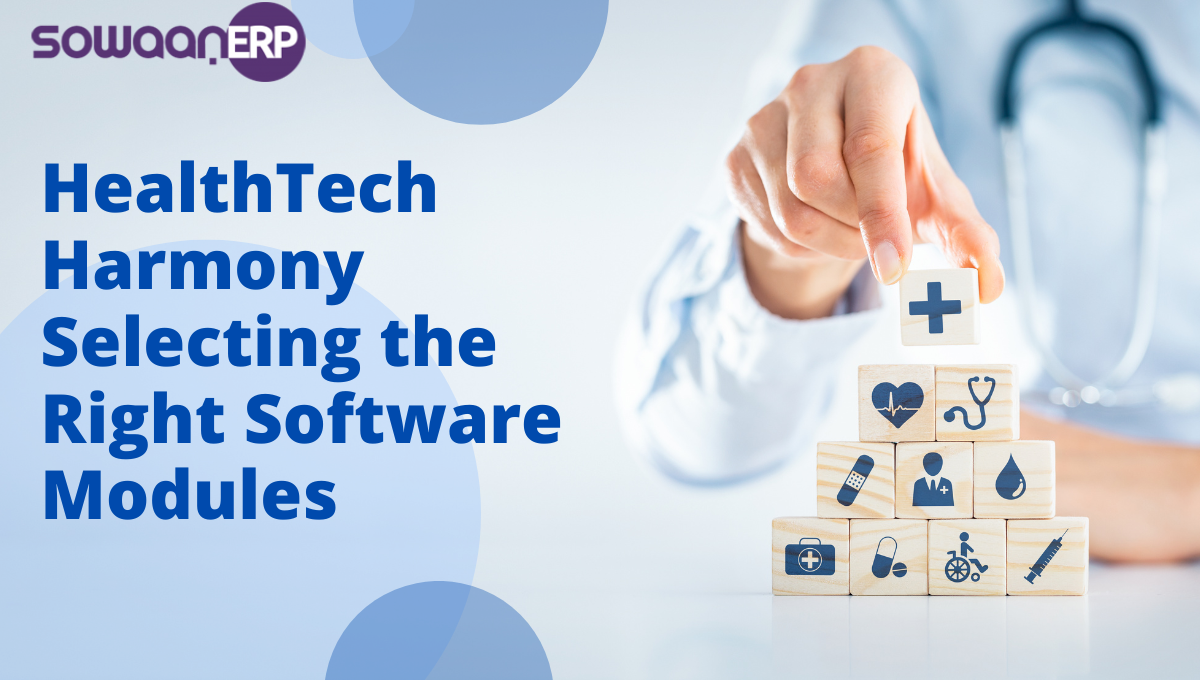Technology is empowering every industry in the ever-evolving landscape. Healthcare is one industry that acquires technology for improving patient care, streamlining operations, and enhancing overall efficiency.
HealthTech solutions are revolutionizing the healthcare industry with the emergence of new software. However, one critical decision that impacts healthcare providers is selecting the right software modules. Choosing the right modules will benefit the healthcare ecosystem.
Let’s explore how to select the right software modules to make informed decisions.
The Significance of HealthTech Software Modules
Healthtech Harmony can be achieved when a business can address all the tasks within a healthcare system. It requires modules for Electronic Health Records (EHR) systems, telemedicine platforms, billing and revenue cycle management, and patient engagement.
Selecting the right modules can be understood through several key points:
Optimized Functionality:
Various modules serve the unique purpose of enhancing the system. Healthtech Harmony can be achieved through optimized functionality. The modules for optimizing functionality can enhance the entire system. This is vital for improving patient care.
Interoperability:
In the rapidly evolving landscape, interoperability has the potential to transform healthcare. Interoperability enables different healthcare information systems to exchange and use data.Achieving interoperability is fundamental to improving patient care, better clinical outcomes, and greater operational efficiency.
Healthtech Harmony can be achieved when the system seamlessly interacts with external systems. The right modules offer interoperability with secure data flow.
Customization:
Customization is essential to meet the unique needs of the healthcare institute. It is evident that all the healthcare providers have different needs. The right modules offer customization, enabling healthcare organizations to tailor the systems. This helps them meet their unique requirements.
Scalability:
Another essential aspect of the healthcare industry is its scalability. Research and technological advancements bring innovations and updates. The technological innovations are adapted in the industry to attain excellence in the field.
This is why the Healthcare systems need to be adaptable to changing demands. The right modules offer scalability to adapt to the environment. The system can add new features to scale the system. It is vital for accommodating growth or changes in healthcare practices.
Compliance and Security:
The benefits of cloud erp in Dubai include Regulatory compliance and data security. Both of these are significant for the healthcare industry. The right modules allow the organization to adhere to industry standards and regulations. This helps in ensuring data privacy and legal compliance.
Cost-Efficiency:
Cost efficiency is the prime feature of a good module. The right modules can save costs by avoiding unnecessary or redundant modules. These can increase the expenses and include complications.
Improved Patient Experience:
The goal of a healthcare organization is to improve patient care. The right modules help in improving patient care with better patient engagement. It fosters communication and coordination.
Guidance for Selecting HealthTech Software Modules
Choosing the right software modules for HealthTech systems can make a difference. Healthcare organizations must consider various aspects to choose the right module. The key steps include:
Assess Your Needs:
Assessing the needs of the healthcare organization is the foremost thing to do. Conduct a thorough needs assessment involving key stakeholders, including clinicians, administrators, and IT experts. This will help in identifying pain points for the inclusion of technology.
Prioritize functionality:
Healthtech Harmony can be achieved by Ranking the functionalities. Assess the importance of the functions of the organization. That means you need to identify which modules are required for day-to-day operations. Moreover, some will also help meet regulatory compliance and patient care. The benefits of cloud erp in Dubai include compliance.
Evaluate Interoperability:
Interoperability is another essential aspect of the system. It is significant to select the modules that integrate with your existing systems. It must handle potential future additions, including data sharing and continuity of care.
Consider Customization:
The best erp in uae offers customization at every level. The healthcare organization must select the modules that offer customization options. Healthcare practices and workflows differ and need a tailored solution. The module must be able to meet the specific needs of the organization.
Examine scalability:
To buy erp software uae, assess if its modules can grow with the organization. Expansion is the key to success, and the healthcare institute needs to ensure it. It is vital for future expansion plans to accommodate increased patient volumes or additional facilities.
Verify Compliance:
Compliance is a non-negotiable aspect of healthcare.
Compliance is essential to avoid any disruption. Healthcare is a sensitive industry that must comply with industry standards and regulations. One of them is HIPAA for data security and interoperability standards.
Conduct Vendor Research:
There are plenty of vendors in the market. To achieve Healthcare harmony, research the best HealthTech vendors by evaluating their reputation. Check for their track record, customer reviews, and user references.
Request Demonstrations:
Request demonstrations or trials of the modules to analyze the software fully. A good hands-on experience offers insights into valuable KPIs.
Consider Long-Term Costs:
The next thing to consider is the total cost of the software. Asses the total cost of ownership with the initial purchase, ongoing maintenance, and support.
Involve End-Users:
Involve clinicians and staff to get valuable perspectives on usability and practicality.
Plan for Training:
Ensuring adequate employee training and support is essential for successful implementation and adoption.
Pilot Test:
Pilot tests can help in selecting the modules in a controlled environment. This helps in identifying and addressing any unforeseen issues before full deployment.The business must also address the challenges of implementing erp software in uae.
Conclusion
Selecting the right software modules is a critical decision that impacts the quality of patient care. It is significant for attaining operational efficiency. However, considering needs assessment, prioritizing functionality and interoperability, scalability, and customization can solve the problem.
The evaluation of vendors before implementation can help in making informed decisions. This leads to Healthcare Harmony as the right modules deliver due care and improve patient experiences. It promotes better well-being of the patients and the system.






